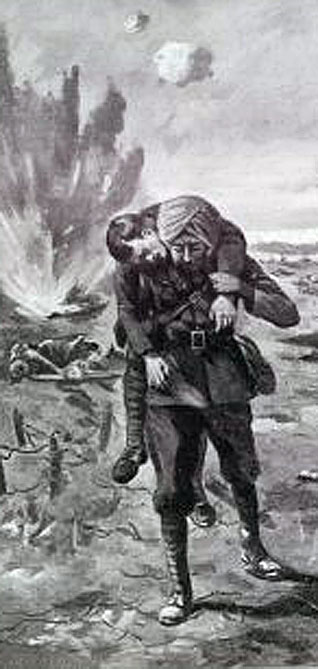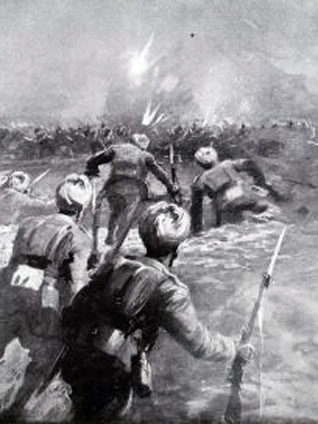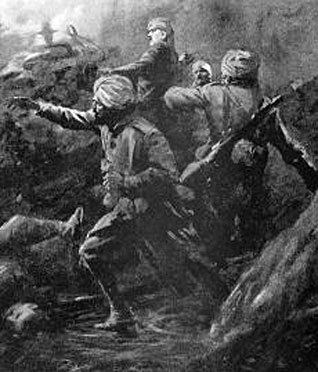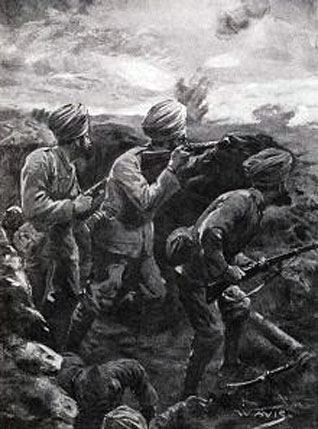With Memorial Day approaching for us here in the United States, one naturally thinks of the soldiers who gave their lives for the freedoms that we sometimes take for granted.
I, too, am reminded of them when I recall the military tradition of the Sikh people.
The Sikhs, identified by their turbans and long beards, are known as "Saint-Soldiers" and have a rich military tradition intertwined with spirituality, dating back more than 300 years.
Despite the fact that Sikhs have lived in the United States for more than a century, this American community remains one of the most misunderstood and relatively unknown minorities in the U.S.
The religion of Sikhism was founded in the 15th century by Guru Nanak, who preached the oneness of God and brotherhood of all mankind. He was followed by nine other Gurus - "Teachers" - whose writings, together with writings of saints belonging to different religious traditions, were compiled by the Sikh Gurus into a grand volume called the Guru Granth Sahib. This is the sole spiritual guide of the Sikhs today.
Despite the peaceful beginnings, their history is a saga of persecutions, wars and holocausts. In order to survive as a race, they were forced to take up arms.
For instance, in the 18th century, the fanatical Mogul rule of northern India rained terror upon the Sikhs and tried to eliminate them in genocidal attacks. But through the bravery and high spirits that the Sikhs carried with them, they were able to survive the genocide attempts and establish their own secular state, Punjab, in northwest part of the subcontinent.
In the 19th century, when the British had taken over Punjab, the Sikhs eventually joined the British-Indian army in large numbers.
The valour of Sikh soldiers during the two world wars is also very well-documented and exemplified by Sir Winston Churchill when he wrote: "British people are highly indebted and obliged to Sikhs for a long time. I know that within this century, we needed their help twice and they did help us very well. As a result of their timely help, we are today able to live with honour, dignity, and independence. In the war, they fought and died for us, wearing the turbans."
Sikhs fought alongside the British in the battles of Ypres, Flanders, the Somme, Gallipoli, Africa, Palestine, Egypt and Mesopotamia - and throughout South-East Asia. Although steel helmets were offered to them for protection, Sikhs instead chose to keep up their religious practice and went to battle in their turbans.
Ultimately, just as the rest of the soldiers paid the ultimate price, so did the Sikhs: in the two World Wars, more than 83,000 Sikh soldiers were killed and more than 109,000 were wounded for the freedom of Europe and the rest of the world.
But unfortunately, the glorious past of the Sikhs has many times been overshadowed by cases of mistaken identity.
For instance, in World War II, the Germans mistook the Sikh POWs for Muslims and took them to Turkey to fight alongside their "fellow Mohammedans." (Eventually, the Sikhs were able to escape and rejoin the allies against the Germans.)
In the 1970s and 1980s, Sikhs in the U.S. were mistaken for Iranians and were assaulted.
Most recently, after the Sept. 11 terrorist attacks, Sikhs became targets of violence.
Several Sikhs in the U.S. were victims of unlawful airport strip searches, their places of prayer were attacked and many have even been beaten and/or killed, simply for practicing their religion.
In other cases, Sikhs have been denied the opportunity to serve in the armed forces, work for the police force or serve in other public arenas.
As the turban is an integral part of a Sikh and is fundamental to the practice of their religion, Sikhs wish only to serve in these forums without having to compromise this religious practice.
But sadly, the very turban that represented valour and freedom at times has become an object of suspicion. Nearly all of the people who wear turbans in the U.S. are Sikhs.
Despite the difficulties faced by Sikhs for more than 500 years, they remain forever optimistic. Their "never say die" attitude keeps the Sikhs' faith alive and well.
As a result, upon arriving in America, Sikhs have explored a wide array of occupations, from physician to lawyer to professor, in an effort to help better the communities in which they reside. This desire to advance and grow their community stems from the faith they have placed in the First Amendment, which allows them to fully practice their religion in the U.S. - the country they have chosen to call home.
So, this Memorial Day, when we gather with families and friends, let us remember all those war veterans who gave their lives for us all.
All Americans, from all backgrounds, need to come together and face the challenges of today and tomorrow and salute those who choose to put their lives on the line.
This privilege should be extended to the Sikh people, who throughout the history of the world have spilled their blood unflinchingly to protect civil liberties.
[Courtesy: The Journal Sentinel. Mohan Singh Dhariwal is a physician at the Medical College of Wisconsin.]
Attachments - Sikh Philosophy Network




More...
I, too, am reminded of them when I recall the military tradition of the Sikh people.
The Sikhs, identified by their turbans and long beards, are known as "Saint-Soldiers" and have a rich military tradition intertwined with spirituality, dating back more than 300 years.
Despite the fact that Sikhs have lived in the United States for more than a century, this American community remains one of the most misunderstood and relatively unknown minorities in the U.S.
The religion of Sikhism was founded in the 15th century by Guru Nanak, who preached the oneness of God and brotherhood of all mankind. He was followed by nine other Gurus - "Teachers" - whose writings, together with writings of saints belonging to different religious traditions, were compiled by the Sikh Gurus into a grand volume called the Guru Granth Sahib. This is the sole spiritual guide of the Sikhs today.
Despite the peaceful beginnings, their history is a saga of persecutions, wars and holocausts. In order to survive as a race, they were forced to take up arms.
For instance, in the 18th century, the fanatical Mogul rule of northern India rained terror upon the Sikhs and tried to eliminate them in genocidal attacks. But through the bravery and high spirits that the Sikhs carried with them, they were able to survive the genocide attempts and establish their own secular state, Punjab, in northwest part of the subcontinent.
In the 19th century, when the British had taken over Punjab, the Sikhs eventually joined the British-Indian army in large numbers.
The valour of Sikh soldiers during the two world wars is also very well-documented and exemplified by Sir Winston Churchill when he wrote: "British people are highly indebted and obliged to Sikhs for a long time. I know that within this century, we needed their help twice and they did help us very well. As a result of their timely help, we are today able to live with honour, dignity, and independence. In the war, they fought and died for us, wearing the turbans."
Sikhs fought alongside the British in the battles of Ypres, Flanders, the Somme, Gallipoli, Africa, Palestine, Egypt and Mesopotamia - and throughout South-East Asia. Although steel helmets were offered to them for protection, Sikhs instead chose to keep up their religious practice and went to battle in their turbans.
Ultimately, just as the rest of the soldiers paid the ultimate price, so did the Sikhs: in the two World Wars, more than 83,000 Sikh soldiers were killed and more than 109,000 were wounded for the freedom of Europe and the rest of the world.
But unfortunately, the glorious past of the Sikhs has many times been overshadowed by cases of mistaken identity.
For instance, in World War II, the Germans mistook the Sikh POWs for Muslims and took them to Turkey to fight alongside their "fellow Mohammedans." (Eventually, the Sikhs were able to escape and rejoin the allies against the Germans.)
In the 1970s and 1980s, Sikhs in the U.S. were mistaken for Iranians and were assaulted.
Most recently, after the Sept. 11 terrorist attacks, Sikhs became targets of violence.
Several Sikhs in the U.S. were victims of unlawful airport strip searches, their places of prayer were attacked and many have even been beaten and/or killed, simply for practicing their religion.
In other cases, Sikhs have been denied the opportunity to serve in the armed forces, work for the police force or serve in other public arenas.
As the turban is an integral part of a Sikh and is fundamental to the practice of their religion, Sikhs wish only to serve in these forums without having to compromise this religious practice.
But sadly, the very turban that represented valour and freedom at times has become an object of suspicion. Nearly all of the people who wear turbans in the U.S. are Sikhs.
Despite the difficulties faced by Sikhs for more than 500 years, they remain forever optimistic. Their "never say die" attitude keeps the Sikhs' faith alive and well.
As a result, upon arriving in America, Sikhs have explored a wide array of occupations, from physician to lawyer to professor, in an effort to help better the communities in which they reside. This desire to advance and grow their community stems from the faith they have placed in the First Amendment, which allows them to fully practice their religion in the U.S. - the country they have chosen to call home.
So, this Memorial Day, when we gather with families and friends, let us remember all those war veterans who gave their lives for us all.
All Americans, from all backgrounds, need to come together and face the challenges of today and tomorrow and salute those who choose to put their lives on the line.
This privilege should be extended to the Sikh people, who throughout the history of the world have spilled their blood unflinchingly to protect civil liberties.
[Courtesy: The Journal Sentinel. Mohan Singh Dhariwal is a physician at the Medical College of Wisconsin.]
Attachments - Sikh Philosophy Network




More...